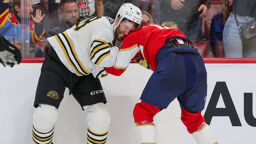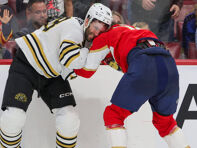It was shaping up to be another great night at the rink for Cadien Shaw. Though his beloved Boston Bruins fell to the Colorado Avalanche in overtime, he saw an incredible game, and in his words, the atmosphere inside Denver’s Ball Arena was a “10.”
A sports fanatic, Shaw, who spent much of his adult life in Boston before moving out West a couple of years ago, always viewed arenas and stadiums as relatively safe spaces. Sure, he would hear the occasional homophobic slur at the urinal, but he didn’t spend a lot of time thinking about whether those words would one day be directed towards him.
It is 2022, after all.
So when three Avalanche fans approached Shaw after the game outside of the bar Brooklyn’s at Ball Arena on Jan. 26, he didn’t think much of it. They spotted him in his Bruins sweater and started razzing him a little bit. In an effort to deescalate the situation, Shaw remembers uttering something along the lines of, “We’ll get you next time.”
But that only made them more aggressive. Shaw says they started to get in his face, and pushed him. He nudged them back, and in a matter of seconds, it was 3-on-1. They shoved Shaw to the ground and started swarming him.
That’s when the anti-gay slurs starting flying. Shaw’s two girlfriends and some bystanders eventually chased his aggressors away, and that night, Shaw went to bed with some bruises and a knot in the back of his head. When he woke up the next morning, he started to piece together what had happened.
The next few days were a malaise.
“I didn’t want sympathy or attention, really. I didn’t tell anybody,” Shaw told Outsports. “I was kind of embarrassed. You get beat up a little bit. And I’m also ashamed it happened in something I consider a safe space: sports. I have so much love and passion for it, and it’s a shame those things happen at those places.”
The incident stuck with Shaw for nearly a week, despite his efforts to forget about it. He felt like something had to be done.
He went to a friend in the police department and asked how to take action. On Tuesday, six days after the incident, Shaw filed a police report.
The Denver Police Department confirmed the case is being investigated by the Bias Motivated Crime Unit.
But Shaw still felt like he was suppressing his emotions. At that point, he still hadn’t even told his mother. So he gave her a call, and posted about his experience on Instagram. Originally, Shaw thought the post would only reach family and friends.
It quickly spread to the NHL community. Out NHL prospect Luke Prokop reached out, as well as ESPN anchor John Buccigross.
The reaction floored Shaw.
“There wasn’t really any motivation in the beginning. I guess it was for my healing, or me trying to move past it,” he said. “I kept it in all week, feeling those things. I was like, ‘I need to figure out how to do this.’ So by filing the police report and then telling people about it, I’m now seeing why I did it. It’s reaching so many people, and starting conversation and change.”
We’ve written extensively about hockey’s historically atavistic culture and the efforts being made to change it. Certainly, the overwhelmingly warm response to Prokop, the recipient of our 2021 Outsports Male Hero of the Year, indicates the NHL is ready for an out gay player.
The league has a longstanding partnership with You Can Play, and pushes its “Hockey is for Everyone” campaign. Every team has hosted a Pride or LGBTQ inclusion night.
But after his experience, Shaw couldn’t help but wonder: what does “hockey is for everyone” really mean?
“The Pride Nights and stuff really aren’t enough. Are people speaking up when they hear slang in the stands, or in the urinal during intermission?,” Shaw said. “Do people speak up when they hear that language in those settings?”
Far too often, casual homophobia is portrayed as an accepted part of male sports culture. While there’s an increased focus to stamp it out amongst players, the fans are part of the game, too.
The NHL and all of these leagues can have their slogans. But real change won’t come until the players themselves speak out.
“It has to start with the NHL, it has to start from the top,” Shaw said. “Where is Alexander Ovechkin when this stuff happens? Where are the big names? Connor McDavid? I could go on. I think their voice makes a big difference.”
Once that happens, it’s easy to imagine a domino effect. The act of condemning homophobic slurs needs to become more normalized than the insults themselves.
“There’s a lot more that needs to be brought to the table,” Shaw said. “When you ask that question about change, it starts at the top, and then trickles down to the players and fans. It’s about holding your fellow fanbase accountable.”
Shaw’s Instagram post isn’t going to change the culture overnight, of course. But it’s getting the conversation started. That’s always a good place to start.







































